By Lucy Komisar
March 27, 2018 –
US journalists Michael Isikoff and David Corn have just published Russian Roulette, an evidence-challenged Russophobic book of the sort that is clogging the media these days. It is a fast cut-and-paste job, including fabrications by William Browder which they apparently never bothered to check out. Since if they cared about their own reputations, they would not have written all that fake stuff.
Here is the letter I wrote them yesterday, which they did not answer. If they had, and had said they would look at the evidence and consider correcting their text, I would have had no need to publish this letter.
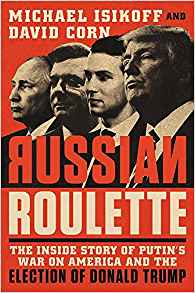 Dear mi******@**th.com>Michael and David,
Dear mi******@**th.com>Michael and David,
Looking through your book “Russian Roulette,” I find important errors relating to William Browder and his Magnitsky story which I would like to point out. I attach or link to the documents that prove what I say.
RR: The story of Sergei Magnitsky was a tragedy. He was a thirty-seven-year-old Russian tax lawyer who had died a painful death in a Moscow prison cell in 2009. He had been hired by Bill Browder, an American-born financier who headed Hermitage Capital Management, a London-based hedge fund.
LK: No, he was not a lawyer, he was an accountant. In the questioning by Russian investigators in 2006, Magnitsky said he was an auditor on contract with Firestone Duncan. Testimonies attached.
Though Browder continued to say Magnitsky was his lawyer in this summer‘s testimony before the Senate Judiciary Committee, two years ago, in his NY federal court testimony in the US government‘s Prevezon case, Browder told a different story. Deposition attached.
He was asked if Magnitsky had a law degree in Russia.
“I‘m not aware that he did,” Browder said.
Did he know if Magnitsky “went to law school?”
“No,” Browder answered.
Why did Browder say he was a lawyer? In his book, he says after his companies were stolen he went out and got the best lawyer he could find. But Magnitsky had been his accountant, handling his taxes, for ten years. He had worked on Hermitage‘s tax evasion. After Magnitsky died, Browder wanted to deflect attention from that as he made Magnitsky a hero and martyr in the grand tale he concocted. And it is grand in its scope and success. Browder is a conman, but a brilliant one. Please read on.
RR: Browder‘s offices were raided by Russian police, its books seized, and its operations shut down.
LK: Hermitage moved all assets out of Russia in 2006 after his visa was cancelled in Nov 2005. So, by the mid-2007 raid, there were no operations in the billion-dollar company to shut down.
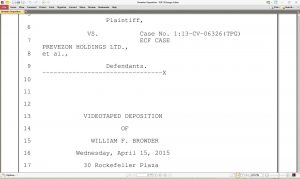
From Browder‘s NY federal court deposition:
Case 1:13-cv-06326-TPG Document 281-1 Filed 05/13/15 Page 154 of 386
2 Q … there no assets in the three Russian companies,
3 correct?
4 A. No.
5 Q. They lost no value, the net worth
6 of Parfenion, Rilend and Makhaon was zero,
7 they had no assets, correct?
8 A. No.
9 Q. They had assets?
10 A. Correct.
11 Q. What assets did they have?
12 A. They had bank accounts.
13 Q. Which had no money in them?
14 A. Is that a question?
15 Q. Yes.
16 A. No, they did have money in them.
17 Q. How much money did they have?
18 A. I can’t be sure, but I think 10-,
19 $15,000.
RR: During his inquiry, Magnitsky discovered that Russian police and tax officials had used documents pilfered from Hermitage Capital to mount a tax fraud that netted them $230 million.
LK: There is no evidence Magnitsky discovered the fraud. Or, what evidence do you have that he did?
In fact, the first clues to the tax refund fraud came in April 2008 from Rimma Starova, a director of the shell company that took over some of the stolen companies, and then Browder talked about it to the NY Times in July 2008. Magnitsky didn‘t mention the matter in testimony till October.
Details: Rimma Starova, a director, in fact a hired ˜name,‘ for Boily Systems, a shell company that had taken control of three Browder companies, perhaps was worried she might take a fall after a reported Browder tax evasion investigation. She went to Russian police April 9, 2008, and told them about about the fake lawsuits involving the Browder companies. (complaint and translation of Starova Complaint) She returned to testify again July 10, 2008. The companies had been used in the scam to get a fake $230-million tax refund from the Treasury. She didn‘t mention the theft, which occurred in Dec 2007, but she gave police a clue and a roadmap.
On July 11, 2008, HSBC, trustee of the Hermitage Fund, filed in British Virgin Islands court against Boily Systems that it said had used Hermitage‘s shells to defraud the Russian government of $230 million. (Hermitage Sept 16 press release)
Actually, HSBC knew about the theft of companies earlier, as indicated by the deposition of HSBC comptroller Albert Dabbah. Though the office searches occurred June 4, 2007, Browder and Magnitsky claimed they learned about the re-registration of their companies only in mid-October. And didn‘t file complaints about it till December. Yet, curiously, by July 2007, Hermitage had already put aside $10 million in a “legal provision” to deal with the matter, noted on a July 27, 2007 redemption document filed by HSBC Private Bank Suisse, which owned about 10 percent of Hermitage shares. (Attached deposition of Dabbah, chief financial comptroller HSBC)
Browder acknowledged he lost nothing, because his stolen companies were empty shells. But in his book “Red Notice,” he said his group filed official complaints about the tax rebate fraud July 23, 2008. They were signed by Paul Wrench, a professional director in Guernsey for offshore companies, who said under oath at U.S. District Court in New York Sept 25, 2015, that the only person he recalled discussing the content with was Ivan Cherkasov, Browder‘s London partner. Not with Magnitsky. Or he didn‘t say so, and by then Browder was telling everyone Magnitsky was the whistleblower, so it was his opportunity to get on message. But he was under oath. Paul Wrench deposition.
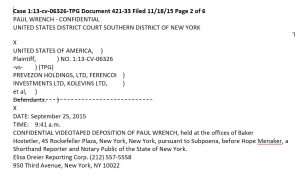
Did you discuss this document with anyone at the time you signed it?
A. At the time I signed it? I would have discussed this document before signing it.
Q. With whom?
A. With Ivan Cherkasov.
Q. Anyone else that you recall?
A. Not that I recall.
Q. Okay. Did you do any independent investigation into the statements in this document prior to signing this document or did you just discuss it with Mr. Cherkasov and then ” and then
sign it?
A. I didn‘t do any separate independent investigation into the contents.
In his book, Browder notes that the story was published July 24, 2008 in Russian newspaper Vedomosti and in the New York Times which reported, “Mr. Browder said he had learned that his former holding companies had been used to embezzle $230 million from the Russian treasury.”
Magnitsky does not mention the fraud until October 7, 2008, at an interrogation to which he was summoned as a suspect in Browder‘s tax evasion –for which he was arrested the following month ” when he tells of “a fraud of budget monetary assets in the amount exceeding 5 (five) billion rubles.” That is six months after Starova‘s first testimony. Three months after the HSBC court filing and publication in Vedomosti and New York Times. From testimony attached.
RR: After Magnitsky filed a criminal complaint accusing Russian officials of fraud, he was arrested and charged with tax evasion.
LK: He did not file such a complaint. Browder doesn‘t say that. He says his lawyers filed complaints about the theft of the companies. Browder says that on December 3, 2007, the Hermitage Fund filed applications with the Investigative Committee of the General Prosecutor‘s Office to open a criminal case into the theft of its three investment companies.
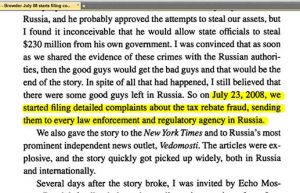
HSBC Management fund manager Paul Wrench wrote the chairman of the Russian Investigative Committee, Alexander Bastrykin, December 10, 2007, to report the theft of Rilend, Parfenion and Makhaon. But the tax refund fraud didn‘t happen till the end of that month. (Browder‘s website posts the complaints.)
In July 2008, seven months after the fraudulent tax rebates occurred, Hermitage filed a complaint about that. Browder wrote in his book, “On July 23, 2008, we started filing detailed complaints about the tax rebate fraud, sending them to every law enforcement and regulatory agency in Russia.” (p236).
Magnitsky had already been interrogated about Hermitage tax evasion in Oct 2006, eight months before the June 2007 raid of Hermitage offices and more than a year before the Dec 2007 fraud. See testimonies. He was detained on suspicion of tax evasion, but not charged.
RR: After his death, an independent investigation found his body was badly bruised, the result of multiple beatings by prison guards.
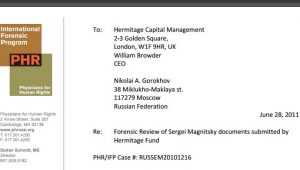
LK: Not true. Where did you get that? The Wall Street Journal links to the definitive prison report by an NGO, the Public Oversight Commission for Human Rights Observance in Moscow Detention Centers. I assume that is the independent investigation you refer to since it is the only one. The report describes appalling conditions and medical care, says nothing about beatings. Browder sent this and another 43 other documents and photos to the US NGO, Physicians for Human Rights, but rather than confirm Browder‘s “determination” of abuse, it repeated the Commission report and said Magnitsky died of untreated illness. No claim of beatings.
The best Browder could come up with is a photo of black and blue marks on Magnitsky‘s wrists and ankles. Not critical organs. He said 8 thugs beat Magnitsky for 1 hour or sometimes he says 8 hours. Did the “killers” aim expertly only for wrists and ankles? And not land any blows on his head or back or chest? Because in Browder‘s “evidence,” there are no other bruises shown. Other more plausible explanations from prison reports: wrists were black and blue because he pulled against handcuffs; ankles because he kicked against bars or doors. A death certificate Browder cites selectively says in a part he does not include: “no signs of a violent death detected.” Attached.
When Magnitsky testified about his conditions in October 14, 2009, a month before he died, he said, “The required medical aid is not provided to me in full. I have repeatedly been prohibited to be visited by my mother and wife or speak over telephone with my minor children. During the period of confinement. I have repeatedly been deprived of the possibility to take a regular shower, have a TV set and a refrigerator or simply live in normal conditions, as far as it is possible in a detention facility.” He didn‘t say anything tougher. Not pleasant. Not beatings. testimony Oct 14, 2009
RR: And Browder initiated a campaign”for him, it was more like a crusade ”to pass a law in the United States that would impose stiff sanctions on Russian officials suspected of involvement in the death of his tax adviser.
LK: Only a handful of the by-now more than 40 Russians charged had anything to do with the prison or medical facilities. The later certainly provided dreadful treatment. Most were in the courts, tax agency, or law enforcement. But the clue to the campaign is, as you acknowledge, Magnitsky was his tax advisor (not lawyer). The Russians were on Browder‘s trail for tax evasion, and he built a brilliant international campaign to defeat the rule of law on tax evasion.
Kalmykia, where his shell companies were registered, allowed companies big tax deductions for hiring the disabled. His tax returns claimed having such hires when in fact they had no employees. They were just shells to hold Russian shares. In his NY federal court deposition, he was asked

20 Q. Who came up with the idea that you
21 could use this tax regime?
22 A. This was a common market practice.
23 There was more than 15,000 companies
24 registered in Kalmykia doing this, and this
25 was — we were advised by Arthur Andersen,
Case 1:13-cv-06326-TPG Document 281-1 Filed 05/13/15 Page 68 of 386
Page 68
1 WILLIAM F. BROWDER (4/15/15)
2 Firestone Duncan, Ernst & Young and various
3 other firms that this was a proper way of
4 organizing our affairs.
5 Q. But the courts in Kalmykia didn’t
6 agree with you, correct?
7 MR. KIM: Objection to form.
8 A. There was — there was — they did
9 and they didn’t.
Well, they didn‘t (some other companies actually hired the disabled), and they filed tax evasion charges. And so began the melodrama.
RR: ….Denis Katsyv, whose Cyprus-based company, Prevezon Holdings, had been charged by U.S. attorney Preet Bharara‘s office with laundering proceeds from the $230 million Russian tax fraud exposed by Sergei Magnitsky and funneling this money into purchases of New York real estate.
LK: Just for perspective, Katsyv was accused of laundering $1.9 million of the $230 million (DOJ and Browder never said they investigated anybody else), and he bought Prevezon after the tax refund fraud money had left the Russian Treasury and started its move through banks. As said earlier, Magnitsky did not expose this. Or do you have evidence?
RR: For details on the death on Sergei Magnitsky, see Red Notice: A True Story of High Finance, Murder, and One Man‘s Fight for Justice, by Bill Browder, Simon & Schuster, 2015.
LK: Now I understand that your only evidence for the claims related to Browder and Magnitsky is that Browder wrote it. Because he provides no evidence in the book. An article about the fabrications in Red Notice would be another long piece. For now, I‘d like to see your own evidence, outside Browder‘s claims, for the assertions I have noted in your book. As investigative journalists, you should have them.
Investigative reporters know not to base their stories on single sources, especially on individuals who have a lot to gain from getting their fake narratives adopted. Remember the motto of the Chicago City News Bureau: “If your mother says she loves you, check it out.”
I write this so that you can correct your book, for the digital version now and print asap, with a note to print buyers of the corrections. If the Browder-Magnitsky part is so wrong, that raises questions about the credibility of the rest of the book.
Lucy
Why would journalists write fake news and ignore documents so readily available?


Pingback: Trending Now #23, 3.23-29.18 | Daily Links & News
These characters seem to have forgotten, if they once knew, what is real journalism. On twitter now, David Corn is claiming to be credible in this area. He tweets: “Point out a single thing I’ve written on Trump and Russia that has been factually discredited.” https://twitter.com/DavidCornDC/status/1115323587676786688
Pingback: 20 fake US media articles on the Browder Magnitsky hoax and one honest reporter (from Cyprus) – The Komisar Scoop